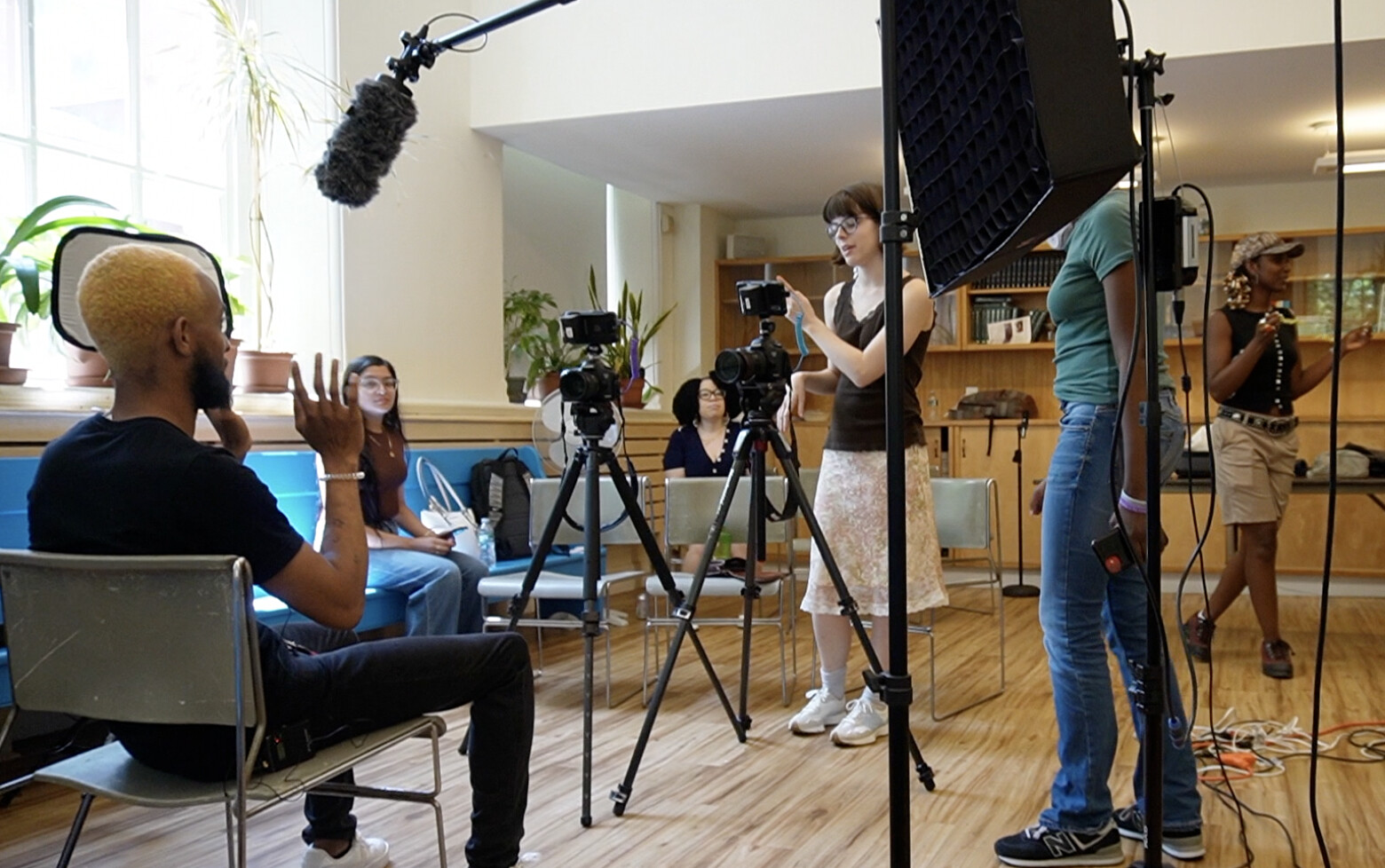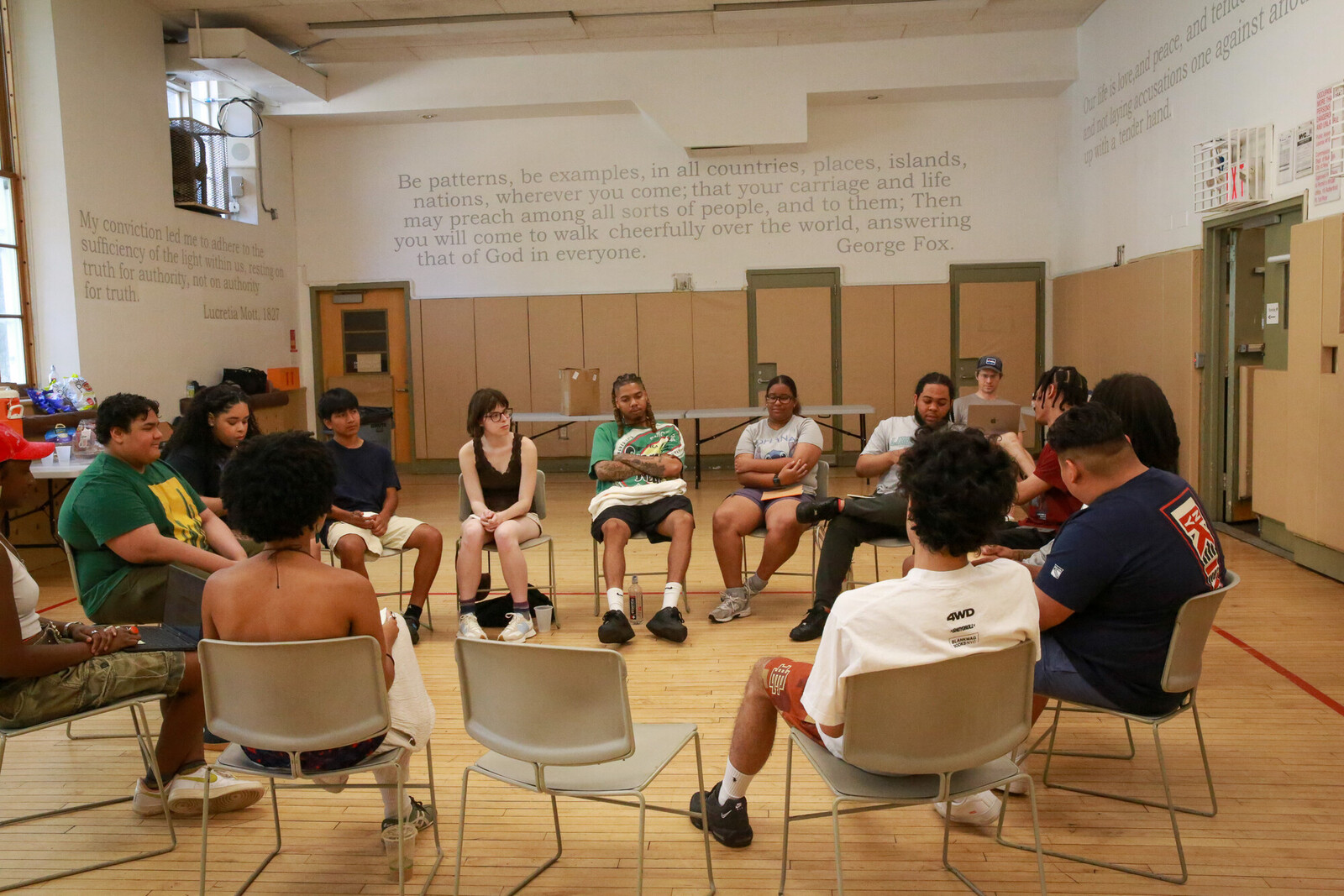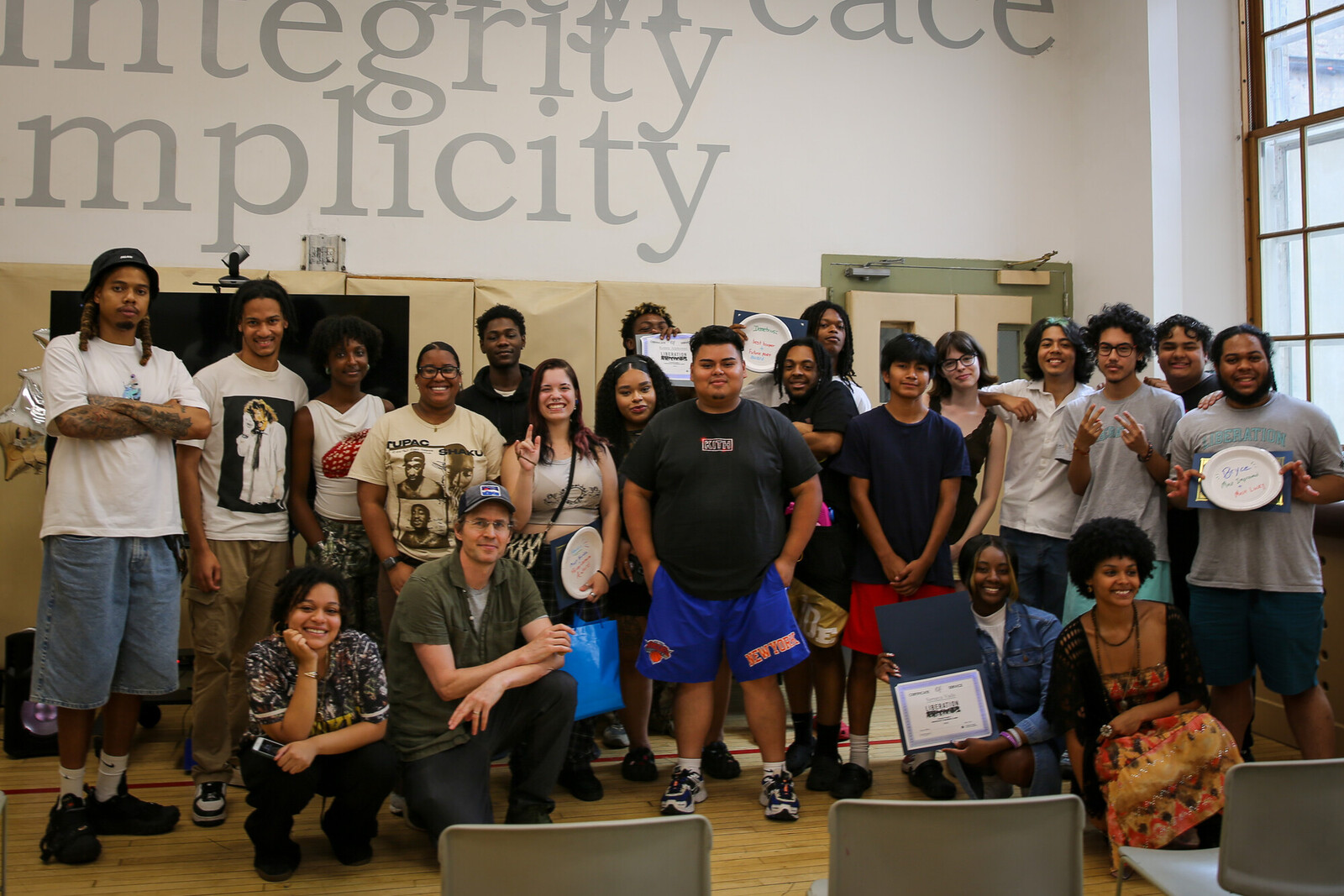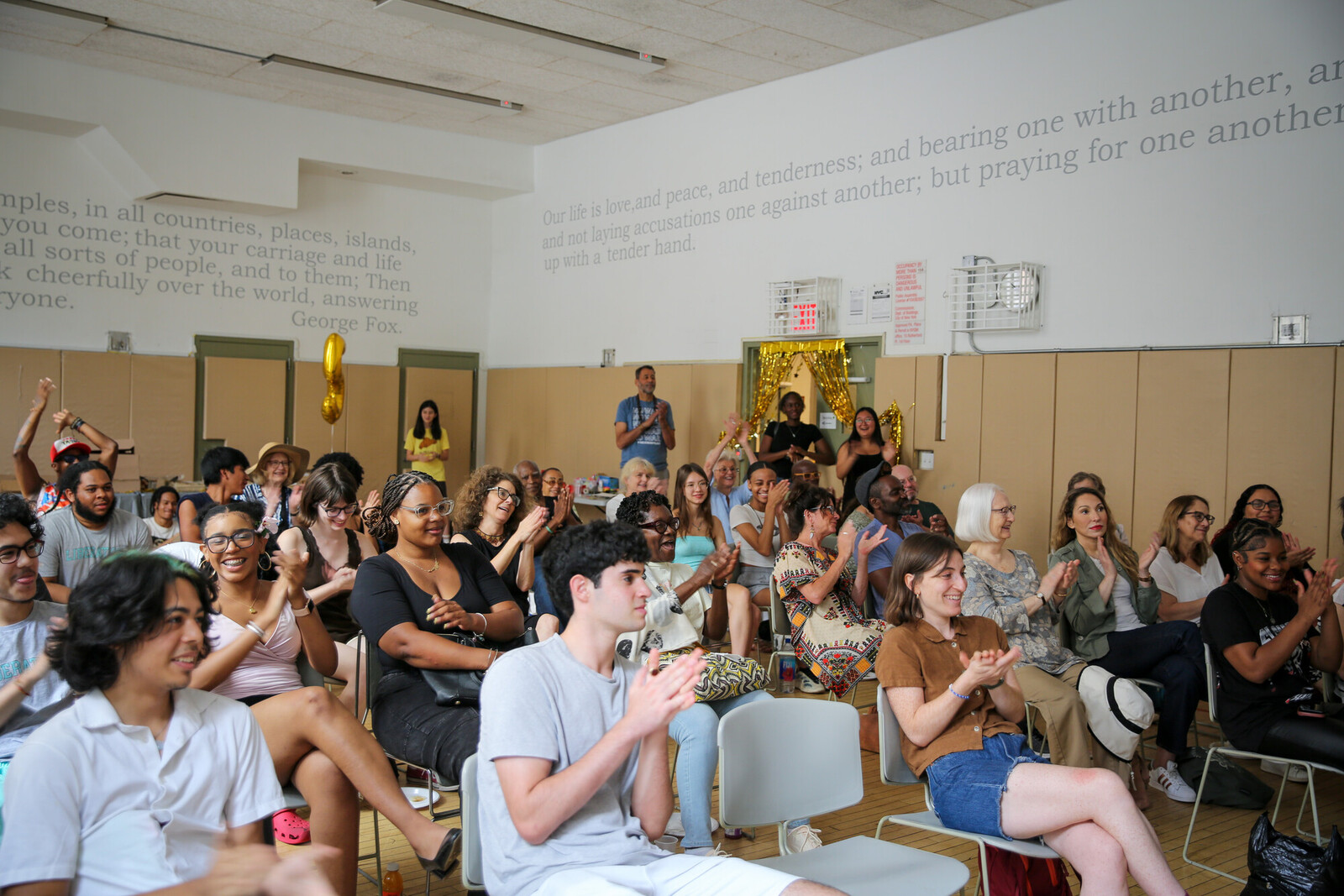
Campers interview a formerly incarcerated community member about their time on Rikers Island
Liberation Summer Camp
Liberation Summer Camp 2025 was a success and focused heavily on our thematic issue—jails—and specifically, Rikers Island Jail Complex. Held from July 7th to August 7th, the camp had a group of 14 participants between the ages of 15 and 22. This group produced three timely and hard-hitting films about the justice system and their experiences of it; the public transit system; and interviews with New Yorkers to find out what they know about the incarceration systems in their city.

Liberation Summer Campers gather for the morning circle ritual
Throughout the five-week camp, campers heard from guest speakers including AFSC’s NJ Organizing Coordinator Julie Flores-Castillo and Migration Director Amy Gottlieb on immigrant rights, how to help combat the negative changes to our immigration system and what campers could do to change narratives about immigration.
Julie guided campers in creating their own know-your-rights red cards to hand out to people in their networks when dealing with the police and U.S. Immigration Customs and Enforcement (ICE). They also created handmade stickers to celebrate the vibrancy of New York and its connection to immigration.
Amy taught campers about her role at AFSC and the current Stronger with Immigrants campaign.
Peacebuilding Director Lewis Webb and Prison Watch Director Bonnie Kerness spoke on the prison and policing systems in New York City and New Jersey, and Lewis led two interactive workshops simulating a court trial—teaching about arraignments, the bail system and what to expect in a trial.
AFSC Prison Watch director Bonnie Kerness brought the campers to Newark, NJ to learn about the work being done in the Edna Mahan Correctional Facility for women and artist Ojore Lutalo showed campers his collage works both from his time in prison and since being released.
Campers also heard from Darren Mack from the Campaign to Close Rikers, who explained the fight to close NYC’s Rikers Island jail complex that has been going on since at least 2017. He also shared some plans for the land the jails sit on after it closes in an attempt to restore the infamous grounds.
We also invited Akeem Browder from the Kalief Browder Foundation to give a presentation about his brother’s story and juvenile justice in NYC, as well as Rikers Island. He gave perspective for campers who had only heard of Kalief Browder’s story from afar and grounded it in why Rikers needs to close.
Houses on the Moon returned to lead campers in a theater-based workshop on the immigration and criminal legal systems in the U.S., which included participants creating short skits that amplified narratives of justice and peace.
The structure of the camp consisted of alternating advocacy days and media days. During advocacy days, we touched on topics such as juvenile justice, wrongful incarceration, and the bail system, and applied those topics to advocacy including campaign work, federal receiverships, court watching, and more. Through this, we showed campers not just the advocacy, but to do hands-on work with court watching, cop watching, and making their own red cards.
Participants also conducted research for their film projects and made connections between the immigration and criminal legal systems while enjoying themselves and coming together with their peers.
A high point of the camp was interviewing experts and formerly incarcerated people to produce their documentary films.
This year’s films varied from an informational video on Rikers Island for teens and young adults; to a poetry film on discrimination in interactions with the police in the city; to research on the Metropolitan Transit Authority (MTA). The first film shed light on the movement to shut down the Rikers Island jail complex, and why it's important for young people to push toward its closure. The film debunked a lot of the rumors surrounding Rikers Island itself and advocated its closing by 2027 as promised.
Many people were interviewed on the street to get their perspectives and gauge their knowledge of what happens at Rikers, what kinds of people are jailed on Rikers Island, and what closing the jails would mean for New Yorkers.
Many subjects were unsurprisingly undereducated about Rikers and how its closure may affect them—some commonly held notions included the belief that all people at Rikers have been convicted of crimes, have been sentenced to serve time there, and that the people held there are violent criminals. In reality, Rikers is a jail not a prison; over 80% of people there are being held pre-trial and have not been convicted of a crime.
Campers intercut person-on-the-street interviews with subject interviews of formerly incarcerated people talking about their time at Rikers, including powerful pleas for advocacy toward its closure.
The second film was a poetry-based film where campers shared meditations on how they are treated when encountering police as Black and brown teens and young adults. Their powerful words were reminders that young people have profound truths to share if the world is open to listen.
The final film, on the MTA, centered on one question: should the MTA be free?
As a result of a debate that the campers had on the PATH train after their Newark field trip, they decided to explore the options and strategies toward achieving free transportation in New York City. They interviewed people on the streets of NYC to learn their opinions on free transportation and on the quality services they experienced while riding the MTA.
They interviewed MTA expert Larry Gould, formerly of the Operations Planning division of Metropolitan Transportation Authority, where he was responsible for short-term service planning for bus and rail, to get his perspective—and found many interesting and shocking ways that our taxes are spent on public transport. While Mr. Gould did not think making the MTA fully free was practical, he did see a path toward people paying less and saving the agency losses from low ridership and fare evasion.
This video highlights the curiosity of the campers in choosing a topic that dramatically affects all New Yorkers, and brings to the fore homelessness, mental health, policing and public safety, and transportation in the nation’s largest city.

Camp Graduation
This year’s graduation ceremony brought together supporters, collaborators, campers, their families, and camp staff to celebrate the achievements of our 2025 cohort. The campers showed their final films, along with other projects they worked on throughout the summer, including the camp wrap-up video. Graduation was an event for the campers to be proud of the hard work they put into the camp, and included time to answer questions from the audience about their films and their experience. They also received personalized shout-outs from the counselors and were given swag bags, certificates, and stipends for participating. It was an event with a turnout of over 50 people who celebrated the campers and their accomplishments.

Alumni Update
Our update includes our time spent with Morgan Washington (Liberation Summer Camp 2023), a senior at Friends Academy and summer camp alum, who worked with us as part of her community service project for her graduation. For three weeks in May 2025, she helped plan for the summer camp and wrote reports on her time in the summer camp. She also helped research the Rikers Island unit for this year’s camp. Her contributions greatly impacted the summer camp, and we were very happy to bring her on board even for such a short period.